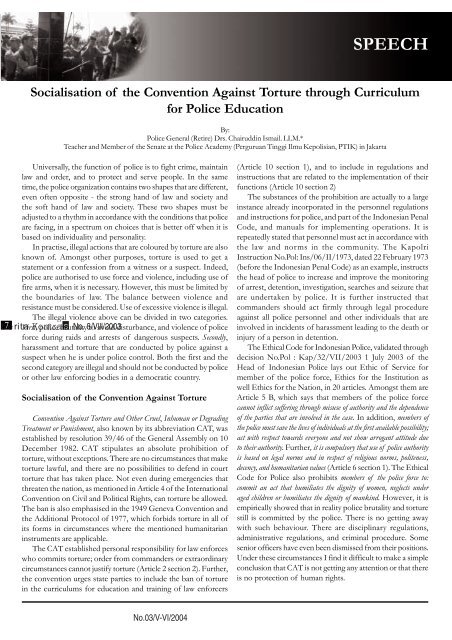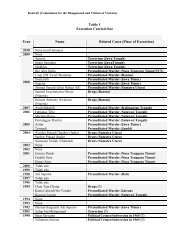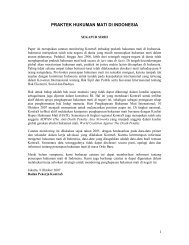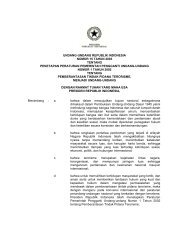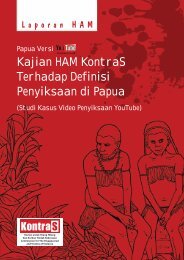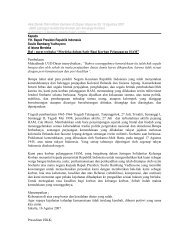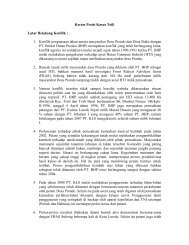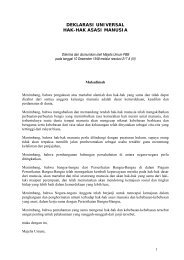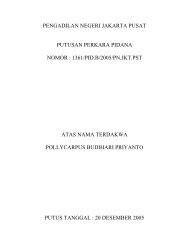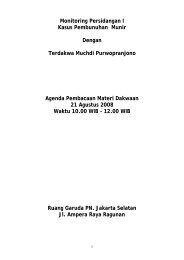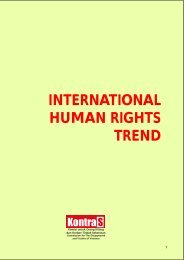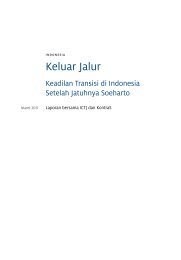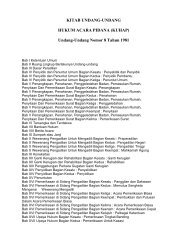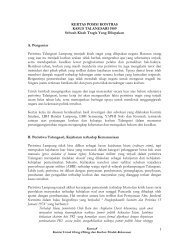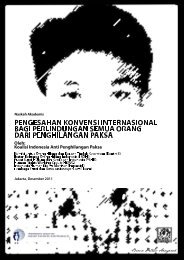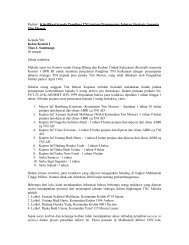buku kontras 1.pmd
buku kontras 1.pmd
buku kontras 1.pmd
You also want an ePaper? Increase the reach of your titles
YUMPU automatically turns print PDFs into web optimized ePapers that Google loves.
SPEECH<br />
Socialisation of the Convention Against Torture through Curriculum<br />
for Police Education<br />
By:<br />
Police General (Retire) Drs. Chairuddin Ismail. LLM.*<br />
Teacher and Member of the Senate at the Police Academy (Perguruan Tinggi Ilmu Kepolisian, PTIK) in Jakarta<br />
Universally, the function of police is to fight crime, maintain<br />
law and order, and to protect and serve people. In the same<br />
time, the police organization contains two shapes that are different,<br />
even often opposite - the strong hand of law and society and<br />
the soft hand of law and society. These two shapes must be<br />
adjusted to a rhythm in accordance with the conditions that police<br />
are facing, in a spectrum on choices that is better off when it is<br />
based on individuality and personality.<br />
In practise, illegal actions that are coloured by torture are also<br />
known of. Amongst other purposes, torture is used to get a<br />
statement or a confession from a witness or a suspect. Indeed,<br />
police are authorised to use force and violence, including use of<br />
fire arms, when it is necessary. However, this must be limited by<br />
the boundaries of law. The balance between violence and<br />
resistance must be considered. Use of excessive violence is illegal.<br />
The illegal violence above can be divided in two categories.<br />
berita 7 First, Kontra police brutality s No. 8/Vlll/2003 to avoid disturbance, and violence of police<br />
force during raids and arrests of dangerous suspects. Secondly,<br />
harassment and torture that are conducted by police against a<br />
suspect when he is under police control. Both the first and the<br />
second category are illegal and should not be conducted by police<br />
or other law enforcing bodies in a democratic country.<br />
Socialisation of the Convention Against Torture<br />
Convention Against Torture and Other Cruel, Inhuman or Degrading<br />
Treatment or Punishment, also known by its abbreviation CAT, was<br />
established by resolution 39/46 of the General Assembly on 10<br />
December 1982. CAT stipulates an absolute prohibition of<br />
torture, without exceptions. There are no circumstances that make<br />
torture lawful, and there are no possibilities to defend in court<br />
torture that has taken place. Not even during emergencies that<br />
threaten the nation, as mentioned in Article 4 of the International<br />
Convention on Civil and Political Rights, can torture be allowed.<br />
The ban is also emphasised in the 1949 Geneva Convention and<br />
the Additional Protocol of 1977, which forbids torture in all of<br />
its forms in circumstances where the mentioned humanitarian<br />
instruments are applicable.<br />
The CAT established personal responsibility for law enforces<br />
who commits torture; order from commanders or extraordinary<br />
circumstances cannot justify torture (Article 2 section 2). Further,<br />
the convention urges state parties to include the ban of torture<br />
in the curriculums for education and training of law enforcers<br />
(Article 10 section 1), and to include in regulations and<br />
instructions that are related to the implementation of their<br />
functions (Article 10 section 2)<br />
The substances of the prohibition are actually to a large<br />
instance already incorporated in the personnel regulations<br />
and instructions for police, and part of the Indonesian Penal<br />
Code, and manuals for implementing operations. It is<br />
repeatedly stated that personnel must act in accordance with<br />
the law and norms in the community. The Kapolri<br />
Instruction No.Pol: Ins/06/II/1973, dated 22 February 1973<br />
(before the Indonesian Penal Code) as an example, instructs<br />
the head of police to increase and improve the monitoring<br />
of arrest, detention, investigation, searches and seizure that<br />
are undertaken by police. It is further instructed that<br />
commanders should act firmly through legal procedure<br />
against all police personnel and other individuals that are<br />
involved in incidents of harassment leading to the death or<br />
injury of a person in detention.<br />
The Ethical Code for Indonesian Police, validated through<br />
decision No.Pol : Kap/32/VII/2003 1 July 2003 of the<br />
Head of Indonesian Police lays out Ethic of Service for<br />
member of the police force, Ethics for the Institution as<br />
well Ethics for the Nation, in 20 articles. Amongst them are<br />
Article 5 B, which says that members of the police force<br />
cannot inflict suffering through misuse of authority and the dependence<br />
of the parties that are involved in the case. In addition, members of<br />
the police must save the lives of individuals at the first available possibility;<br />
act with respect towards everyone and not show arrogant attitude due<br />
to their authority. Further, it is compulsory that use of police authority<br />
is based on legal norms and in respect of religious norms, politeness,<br />
decency, and humanitarian values (Article 6 section 1). The Ethical<br />
Code for Police also prohibits members of the police force to:<br />
commit an act that humiliates the dignity of women, neglects under<br />
aged children or humiliates the dignity of mankind. However, it is<br />
empirically showed that in reality police brutality and torture<br />
still is committed by the police. There is no getting away<br />
with such behaviour. There are disciplinary regulations,<br />
administrative regulations, and criminal procedure. Some<br />
senior officers have even been dismissed from their positions.<br />
Under these circumstances I find it difficult to make a simple<br />
conclusion that CAT is not getting any attention or that there<br />
is no protection of human rights.<br />
No.03/V-VI/2004


